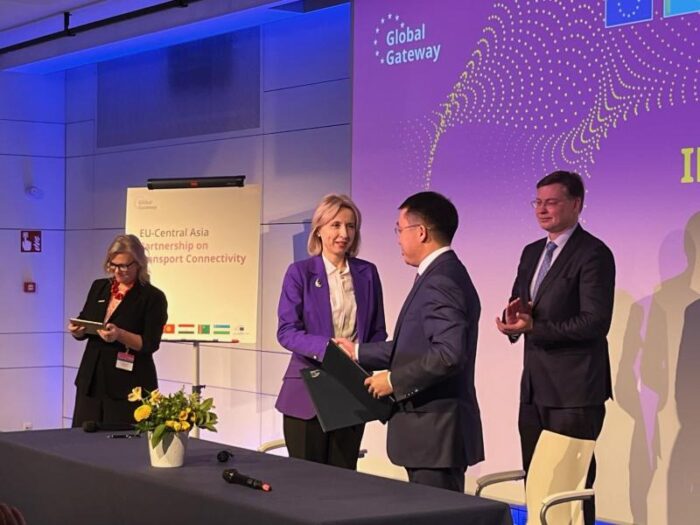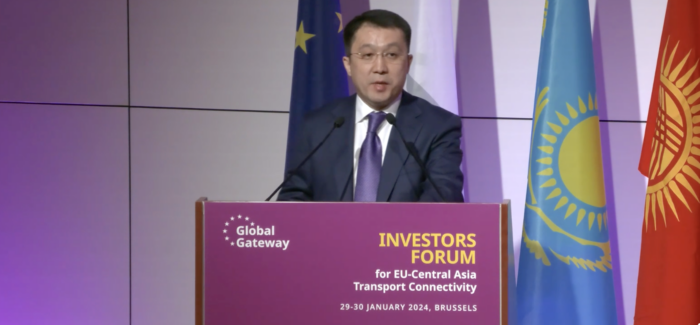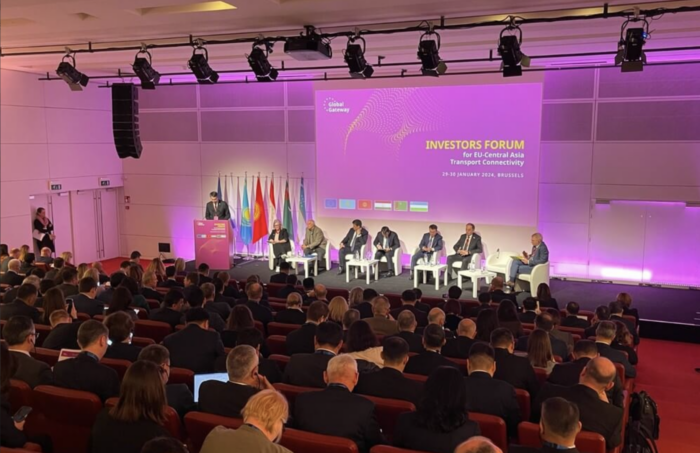ASTANA – The Global Gateway Investors Forum for the European Union – Central Asia Transport Connectivity kicked off with a plenary session on Jan. 29 in Brussels. The European and international financial institutions announced the 10 billion euros (US$10.2 billion) commitment to invest in the development of the Trans-Caspian International Transport Route (TITR) connecting Europe and Central Asia.

EIB Vice-President Teresa Czerwinska and Kazakh Minister of Transport Marat Karabayev on Jan. 29 in Brussels. Photo credit: eib.org.
As part of the two-day event, the European Investment Bank (EIB) Global has also signed memoranda of understanding for project co-financing with Kazakhstan, the Kyrgyz Republic, Uzbekistan, and the Development Bank of Kazakhstan (DBK) worth 1.47 billion euros (US$1.6 billion).
“Transport is the backbone of the modern economy, facilitating personal mobility and enabling goods, capital, and services to be exchanged between the countries of the region. In addition, investing in sustainable transport is key to addressing climate impact and enhancing the resilience of transport networks,” said EIB Vice-President Teresa Czerwinska.
The long-term objective is to enhance the capacities of the Trans-Caspian International Transport Route (TITR), known as the Middle Corridor. For this purpose, the forum provides a platform for considering specific actions and mobilizing financial commitments. It is imperative for the key stakeholders to strengthen connectivity within the Central Asian region through the Global Gateway initiative, the EU’s strategy aimed to invest in infrastructure projects worldwide.
In this regard, the EIB’s support for sustainable transport in the region is expected to mobilize additional capital resulting in total support for sustainable transport projects of 3 billion euros (US$3.2 billion). The bank will also share its expertise with Central Asian partners. Over the last decade, it has financed transport projects worth 136.5 billion euros (US$148 billion) globally.
“In the spirit of collaboration and progress, the Investors’ Forum marks a pivotal step towards realizing the ambitious vision of the Trans-Caspian Transport Corridor. Together, we strive to achieve a faster, more reliable connection between Europe and Central Asia, fostering stronger ties and opening new avenues for cooperation and trade. I am very pleased to see that international partners present today are committing to provide €10 billion ($US10.2 billion) in investments to develop sustainable transport connectivity in Central Asia, including new European Commission and European Investment Bank commitments of €1.5 billion (US$1.6 billion), with more to come through the Commission’s open architecture for investment guarantees,” said European Commission Executive Vice-President Valdis Dombrovskis.
In his welcoming speech at the plenary session, Dombrovskis noted that “the EU is already Central Asia’s largest investment partner, accounting for more than 42% of total foreign direct investments (FDI).”
The signing of the memoranda of understanding, he emphasized, represents an opportunity for both the EU and Central Asian countries to strengthen trade relations in a way that benefits both regions.
According to European Commission Vice President Margaritis Schinas, the forum is “an important milestone in the EU-Central Asia partnership, bringing together public and private investors from both regions to kickstart the work on the Trans-Caspian Transport Corridor to link Europe and Central Asia in a fast, safe, and sustainable way, in line with the EU Global Gateway strategy.”
Vice-President of the European Commission Josep Borrell emphasized the need for closer partnerships to address global challenges.
“Central Asia has become a crucial partner for the EU with its vast potential notably in terms of security and connectivity, as well as energy and resource diversification. To be better prepared to face today’s challenges, both Europe and Central Asia need to strengthen their resilience and diversify their political and economic relationships,” he said.
For Transport Commissioner Adina Valean, the Middle Corridor is the cornerstone of the efforts aimed at promoting regional economic integration and further growth in the region, as well as better connections with Europe. “We have identified 33 physical infrastructure investment needs, ranging from modernizing railways to increasing port capacity and fleet renewal,” she said.

Kazakh Minister of Transport Marat Karabayev. Photo credit: The Astana Times.
Kazakh Minister of Transport Marat Karabayev expressed gratitude to the European partners for the efforts to fortify ties with Central Asian countries through the Global Gateway initiative and shared the statistics on Kazakhstan’s transport sector.
“Last year, the cargo turnover by railway amounted to 300 million tons, 85 million of which are Kazakhstan’s exports. More than 27 million tons are transit traffic. In addition, 80% of the railroad transportation between China and the EU goes through Kazakhstan,” said Karabayev.
“As for road transportation, it is growing at an outstripping rate. By the end of last year, Kazakhstan’s transit traffic only with China increased two times – from 1 to 2 million tons, and the total transit volume increased by 43% from 3.5 to 5 million tons,” he added.
The Kazakh minister highlighted the positive dynamics of EU-Kazakhstan cooperation, recalling recent developments, including Kazakhstan’s participation at the Global Gateway Forum in Brussels in October last year, and a meeting with the Vice President of the European Commission Margaritis Schinas a week ago.

Photo credit: business.com.tm.
Kazakhstan is the only Central Asian country to have introduced the fifth degree of freedom, the right to carry passengers and cargo between two countries where neither is the home base of the airline operating it. Karabayev noted that over the past two years, the use of Kazakhstan’s airspace has doubled.
“We also completed the negotiation process with the European Commission to sign a horizontal agreement, which will allow each European airline to fly from any part of Europe to any point in Kazakhstan,” he said.
The two largest airports in Kazakhstan were transferred into private ownership. The Almaty International Airport is now owned by TAV, a Turkish airport operation and services firm, which is part of Groupe Aeroports de Paris (ADP). Nursultan Nazarbayev International Airport in Astana, in turn, is under the trust management of the UAE’s Terminals Holding.
Karabayev announced that Kazakhstan is ready to “give the remaining 22 airports to European investors for management, which have a great potential to become a transit hub between Asia and Europe.”
He emphasized that “at least €40 billion ($43.2 billion) will be needed to implement major infrastructure projects.”
As part of the opening session, high-level representatives from Central Asian countries, Deputy Chairman of the Cabinet of the Ministers of the Kyrgyz Republic Bakhyt Torobayev, Deputy Prime Minister of Uzbekistan Jamshid Khodjaev, Transport Minister of Tajikistan Azim Ibrohim, Deputy Director-General of the Agency for Transport and Communications under the Cabinet of Ministers of Turkmenistan Batyr Annayev, delivered opening remarks, commending the EU’s support and expressing hope for the fruitful cooperation.
The development of the Trans-Caspian transport network is now an important part of the increased and deepened EU-Central Asia cooperation. The multimodal route starts from Southeast Asia and China and runs through Kazakhstan, the Caspian Sea, Azerbaijan, Georgia, and further to European countries.
